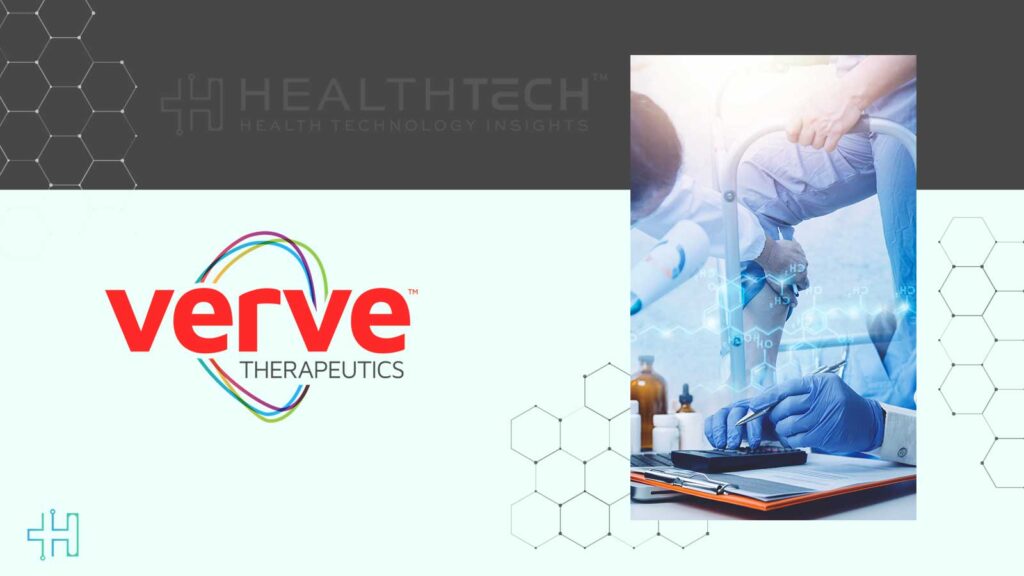Single infusion of VERVE-102 led to dose-dependent decreases in blood PCSK9 and LDL-C, with mean reduction in LDL-C of 53% and a maximum reduction of 69% observed in the 0.6 mg/kg dose cohort
Verve Therapeutics, a clinical-stage company developing a new class of genetic medicines for cardiovascular disease, announced positive initial data from the Heart-2 Phase 1b clinical trial of VERVE-102. The Heart-2 Phase 1b clinical trial is evaluating patients with heterozygous familial hypercholesterolemia (HeFH) and/or premature coronary artery disease (CAD), two populations that require deep and durable reductions of low-density lipoprotein cholesterol (LDL-C) levels in the blood. Among 14 participants across three dose levels, VERVE-102 was well-tolerated, with no treatment-related serious adverse events (SAEs) and no clinically significant laboratory abnormalities observed. A single infusion of VERVE-102 led to dose-dependent decreases in blood PCSK9 protein levels and LDL-C, with a mean reduction in blood LDL-C of 53% and a maximum LDL-C reduction of 69% observed among four participants in the 0.6 mg/kg dose cohort.
Health Technology Insights: WEA Foundation to Expand School Mental Health Programs
“These initial Heart-2 data are promising with respect to both safety and efficacy and suggest the potential for a new era of cardiovascular disease treatment where a single dose might lead to lifelong control of LDL-C,” said Eugene Braunwald, M.D., Distinguished Hersey Professor of Medicine at Harvard Medical School and Founding Chairman, TIMI Study Group, Brigham and Women’s Hospital. “Despite existing treatments to lower LDL-C, atherosclerotic cardiovascular disease (ASCVD) remains the most frequent cause of death worldwide. The reduction of ASCVD risk depends on both the magnitude of LDL-C reduction as well as the duration. With existing treatments, approximately half of patients discontinue their prescribed lipid lowering therapy within one year, resulting in poor real-world control of LDL-C. VERVE-102 holds great promise to transform the care of ASCVD and move that care from daily pills or intermittent injections over decades to a one dose future for sustained LDL-C lowering.”
VERVE-102
VERVE-102 is a novel, in vivo, investigational base editing medicine designed to be a single-course treatment that permanently turns off the PCSK9 gene in the liver and durably reduces disease-driving LDL-C. VERVE-102 consists of an adenine base editor and a guide RNA (gRNA) targeting the PCSK9 gene. Both are encapsulated in a lipid nanoparticle (LNP) and administered as a single intravenous infusion over two to four hours. VERVE-102 uses Verve’s proprietary GalNAc-LNP delivery technology, which is designed to allow the LNP to access liver cells using either the low-density lipoprotein receptor (LDLR) or the asialoglycoprotein receptor (ASGPR).
Health Technology Insights: Green Security Appoints Reuben Lee as Chief Financial Officer to Spearhead Strategic Growth
Heart-2 Clinical Trial Design
The Heart-2 clinical trial is an open-label Phase 1b clinical trial designed to evaluate the safety and tolerability of VERVE-102 administration in adult patients with HeFH and/or premature CAD who require additional lowering of LDL-C. The trial is a single-ascending dose study and endpoints include pharmacokinetics and changes in blood LDL-C and PCSK9 protein levels. HeFH is diagnosed based on high LDL-C levels, a personal or family history of ASCVD, physical exam features, and/or mutations identified in certain genes. Premature CAD is defined as evidence of CAD (heart attack, coronary revascularization procedure, or coronary atherosclerosis on imaging) occurring in men ≤ 55 years old or women ≤ 65 years old.
The Heart-2 clinical trial is expected to include four dose cohorts, each comprised of three to nine participants with HeFH and/or premature CAD. Initial data reported today are from 14 participants across the first three cohorts (weight-based cohorts of 0.3 mg/kg, 0.45 mg/kg, and 0.6 mg/kg) with at least 28 days of follow-up for each participant as of a data cutoff date of March 13, 2025.
Heart-2 Safety and Tolerability
VERVE-102 has been well-tolerated, with no treatment-related SAEs, no dose-limiting toxicities, and no cardiovascular events observed. Across all 14 participants, there was one infusion related reaction (Grade 2) which involved transient symptoms that resolved with acetaminophen. No clinically significant changes in alanine aminotransferase (ALT), aspartate aminotransferase (AST), bilirubin, or platelets were observed at any dose level. There were no dose-dependent trends in any of these laboratory measurements.
Heart-2 Efficacy Analysis
Following a single infusion of VERVE-102, dose-dependent reductions in two pharmacodynamic (PD) measures were observed: blood LDL-C and PCSK9 protein levels. Of note, in this patient population, LDL-C is a validated surrogate endpoint for clinical benefit accepted by the U.S. Food and Drug Administration (FDA) and other regulatory agencies.
Mean blood LDL-C and PCSK9 protein reductions from baseline, using a time-averaged percent change from day 28 through the last available follow-up, were as follows:
- Cohort 1; 0.3 mg/kg (n=4): LDL-C reduction was 21% and PCSK9 reduction was 46%.
- Cohort 2; 0.45 mg/kg (n=6): LDL-C reduction was 41% and PCSK9 reduction was 53%.
- Cohort 3; 0.6 mg/kg (n=4): LDL-C reduction was 53% and PCSK9 reduction was 60%.
Among the 14 participants, a maximum LDL-C reduction of 69% was achieved in a participant in the 0.6 mg/kg cohort.
Health Technology Insights: Novotech Secures Investment from GIC, Temasek, TPG
For LNP-delivered in vivo gene editing medicines, total RNA dose administered is emerging as a key driver of PD. As such, Verve also evaluated the Heart-2 PD data by total RNA dose. The analysis includes the 14 participants in the Heart-2 clinical trial grouped into three ranges of total RNA dose administered: < 25 mg (n=4), 25 – < 50 mg (n=7), and 50 – < 60 mg (n=3).
Across all 14 participants, VERVE-102 demonstrated a strong dose-dependent response between the amount of total RNA administered and LDL-C reductions. Three participants received a total RNA dose between 50 and 60 mg, with an average dose received of 55 mg of total RNA. In this dose group, VERVE-102 demonstrated a time-averaged LDL-C mean reduction of 59%. Each of the three participants who received a dose ≥ 50 mg achieved a > 50% time-averaged reduction of LDL-C from baseline.
“Verve was founded seven years ago with a vision of one treatment dose potentially leading to a lifetime of LDL-C lowering. The data presented today suggest that this game-changing, one dose future is possible,” said Sekar Kathiresan, M.D., co-founder and chief executive officer of Verve Therapeutics. “We are pleased by the safety VERVE-102 has demonstrated so far, and our proprietary GalNAc-LNP delivery technology is showing a potentially best-in-class safety profile. The initial efficacy data suggest that VERVE-102 has the potential to match or exceed the LDL-C reduction provided by currently available PCSK9-targeting therapies. Among participants who received a dose greater than 50 mg total RNA, we observed a mean LDL-C reduction of 59% and a maximum LDL-C reduction of 69%. Furthermore, VERVE-101 has continued to show excellent durability for the base editing mechanism out to nearly two years, with follow-up ongoing.”
Dr. Kathiresan continued, “In sum, VERVE-102 has the potential to solve the urgent need for enduring efficacy in patients living with HeFH or ASCVD. We are incredibly grateful to the patients and healthcare professionals who believe in our mission and participate in our clinical trials. Together, we are striving to revolutionize cardiovascular disease treatment and deliver a one dose future.”
Next Steps
The Heart-2 clinical trial is enrolling participants in the fourth dose cohort of 0.7 mg/kg in the United Kingdom, Canada, Israel, Australia, and New Zealand. As of April 7, 2025, Verve has dosed two participants in this cohort. The early laboratory and clinical safety profile is in line with the first three cohorts. Verve expects to announce the final data from the dose escalation portion of the Heart-2 clinical trial, including durability data, in the second half of 2025.
Verve plans to dose the first patient in the Phase 2 clinical trial of VERVE-102 in the second half of 2025, subject to regulatory clearance. With the recent clearance by the U.S. FDA of the investigational new drug (IND) application for VERVE-102, Verve expects to enroll patients at U.S. trial sites in the Phase 2 clinical trial. Verve expects its current capital position to be sufficient to fund its operations into mid-2027, which includes the completion of the Phase 2 clinical trial.
Under the PCSK9 program collaboration agreement with Verve, Eli Lilly and Company (Lilly) holds the right to opt-in to share worldwide development expenses (33% contributed by Lilly) and to jointly commercialize and share profits and expenses related to commercialization in the U.S. on a 50/50 basis. Verve retains control of the development and commercialization of all collaboration products in the U.S., and Verve holds all product rights outside the U.S. Verve expects to deliver the opt-in package for the PCSK9 program and receive a decision from Lilly in the second half of 2025.
Health Technology Insights: Your Behavioral Health Appoints Matthew Zubiller as Chief Executive Officer
To participate in our interviews, please write to our HealthTech Media Room at sudipto@intentamplify.com
Source – GlobeNewswire



